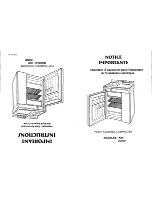
9 Care and maintenance
▪
Depending on the product, the following packaging materials are suitable: freezer
bags, aluminium foil or plastic boxes. Freezer burn can be avoided by making the
food packaging as airtight as possible.
▪
Do not refreeze food once defrosted! Only after being prepared (through cooking or
frying) can it be refrozen.
▪
Blanch vegetables before freezing. Aubergines, sweet peppers, courgettes, mush-
rooms, asparagus and herbs do not have to be blanched.
▪
The following products are not suitable for freezing: radishes, lettuces, cucumbers,
raw unshelled eggs, boiled eggs, dairy products such as yogurt, cream cheese, curd
cheese and mayonnaise.
▪
Do not defrost frozen food at room temperature or on the heating. Food defrosts
slowly in the fridge. As a quick alternative, defrost in a microwave or steam cooker.
8.4
Notes on saving energy
▪
Leave the drawers, glass shelves and door trays as far as possible in the positions
that they were in upon delivery. These ensure ideal temperature distribution and effi-
ciency.
▪
Only open the appliance doors when necessary and keep them open for as short a
time as possible.
▪
Allow hot or warm food to cool down before putting it in the appliance.
▪
Store food that releases moisture in closed containers or covered in the refrigerator
compartment. Moisture can cause the rear wall of the refrigerator to ice up more
quickly and reduce its cooling capacity.
▪
For ideal air circulation: Do not store food and food items too close to each other.
9
Care and maintenance
9.1
Cleaning
For hygienic storage of food and meals, the interior should always be kept clean.
Do not use any abrasive cleaning agents or scouring cloths to clean the appliance.
Take care not to press too hard when cleaning the plastic surfaces.
Risk of causing damage to the appliance.
▸ Condensation can form in the vegetable drawers and on the glass shelves, depending
on the kind and quantity of food being stored. Regularly wipe condensation away with
a dry cloth.
▸ Clean the interior at regular intervals with a mild soapy solution and wipe dry thor-
oughly.
▸ Clean the operating and display elements just with a damp cloth.
▸ Regularly check the door seals and if dirty clean using a soft brush and clean water.
Wipe dry.
▸ If the appliance is not to be used for a while, switch it off. Clear out, defrost and clean
the appliance. Leave the refrigerator and freezer compartment doors open.
Ensure that no cleaning water runs through the defrost drainage channel into the
evaporation tray.
Risk of causing damage to the appliance.
17












































